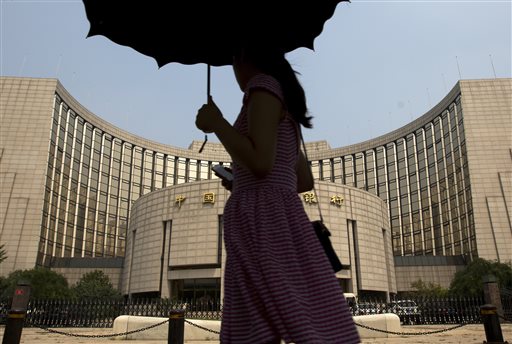
In this Aug. 11, 2015 photo, a woman holding an umbrella walks past China’s central bank People’s Bank of China in Beijing. Chinas central bank governor has told a meeting of the G-20 that Chinas currency has stabilized against the dollar after the countrys surprise announcement last month to revalue the yuan amid stock market turmoil. (AP Photo/Andy Wong)
BEIJING — China’s central bank governor says its currency has stabilized, in an apparent effort to dispel fears of more big declines following a surprise devaluation that rattled global markets.
The yuan’s exchange rate against the dollar “tends to be stable,” Zhou Xiaochuan said at a meeting of finance officials of the Group of 20 major economies in Turkey on Friday, according to a central bank statement.
Beijing said the Aug. 11 devaluation was part of efforts aimed at making the yuan’s state-set exchange rate more market-oriented. But coming without warning amid a collapse in Chinese share prices, it caused anxiety in financial markets.
Zhou’s comments appeared to be aimed at quelling fears Beijing might allow the currency, also known as the renminbi, to fall further to help its struggling exporters by giving them a price advantage. The devaluation had spurred warnings of a possible “currency war” if other governments responded by lowering their own exchange rates.
“At present, the exchange rate of the RMB against the dollar tends to be stable, and most of the correction of the stock market has taken place, so the financial market is expected to be more stable,” the statement read.
Zhou said Beijing was committed to carrying out economic reforms despite recent turbulence in its financial markets.
Also at the G-20 meeting, Finance Minister Lou Jiwei tried to defuse concern about the slowdown in Chinese economic activity, saying Beijing is “not especially concerned” about short-term fluctuations and will stick to its reform plans.
The ruling Communist Party is in the midst of a marathon effort to encourage domestic consumption and reduce reliance on trade and investment to drive growth. It has promised to give market forces a bigger role in the state-dominated economy.
Concerns have mounted, however, that growth is slowing too abruptly after July exports and auto sales contracted and August factory activity weakened.
Lou said the Chinese government expects economic growth of “about 7 percent” this year, according to the central bank statement.
“China is in line with plans and will stick unswervingly to ‘reform and opening up,'” he said.